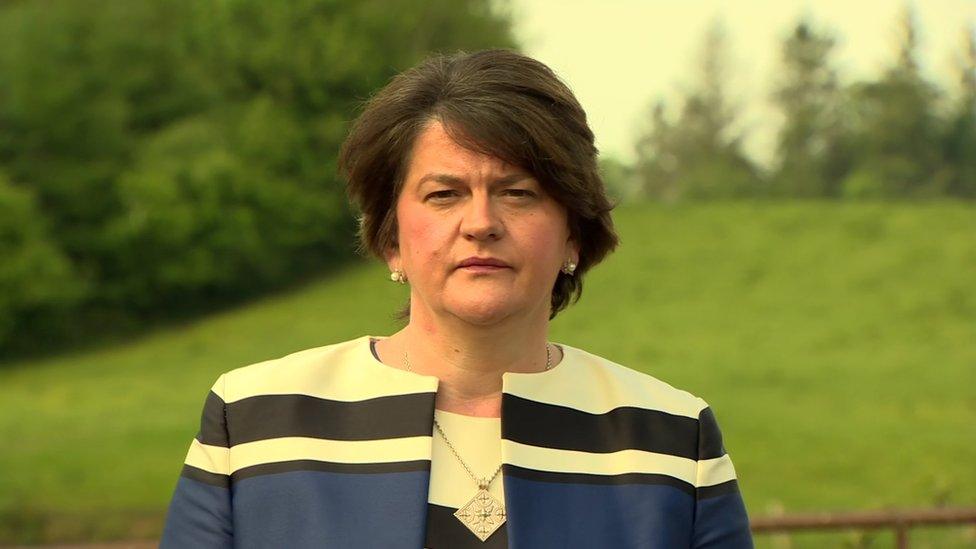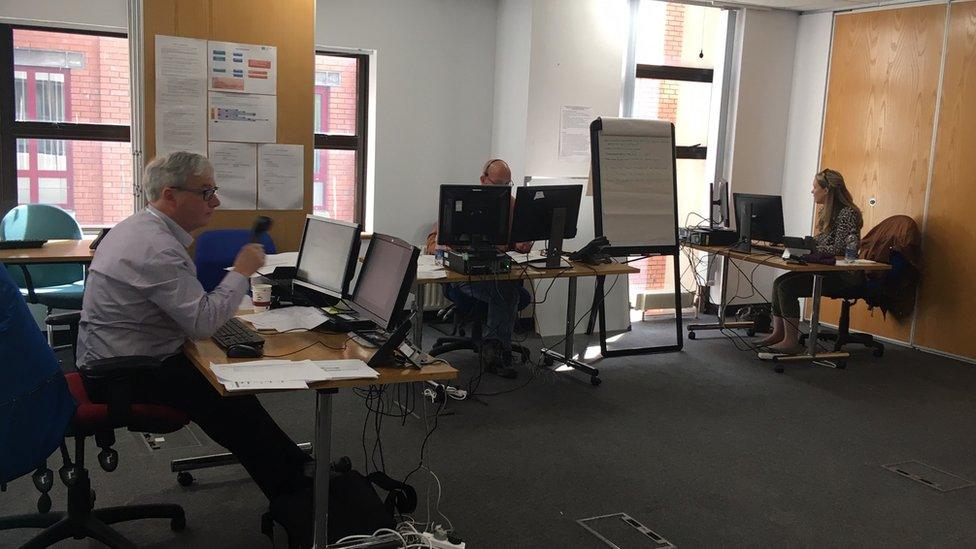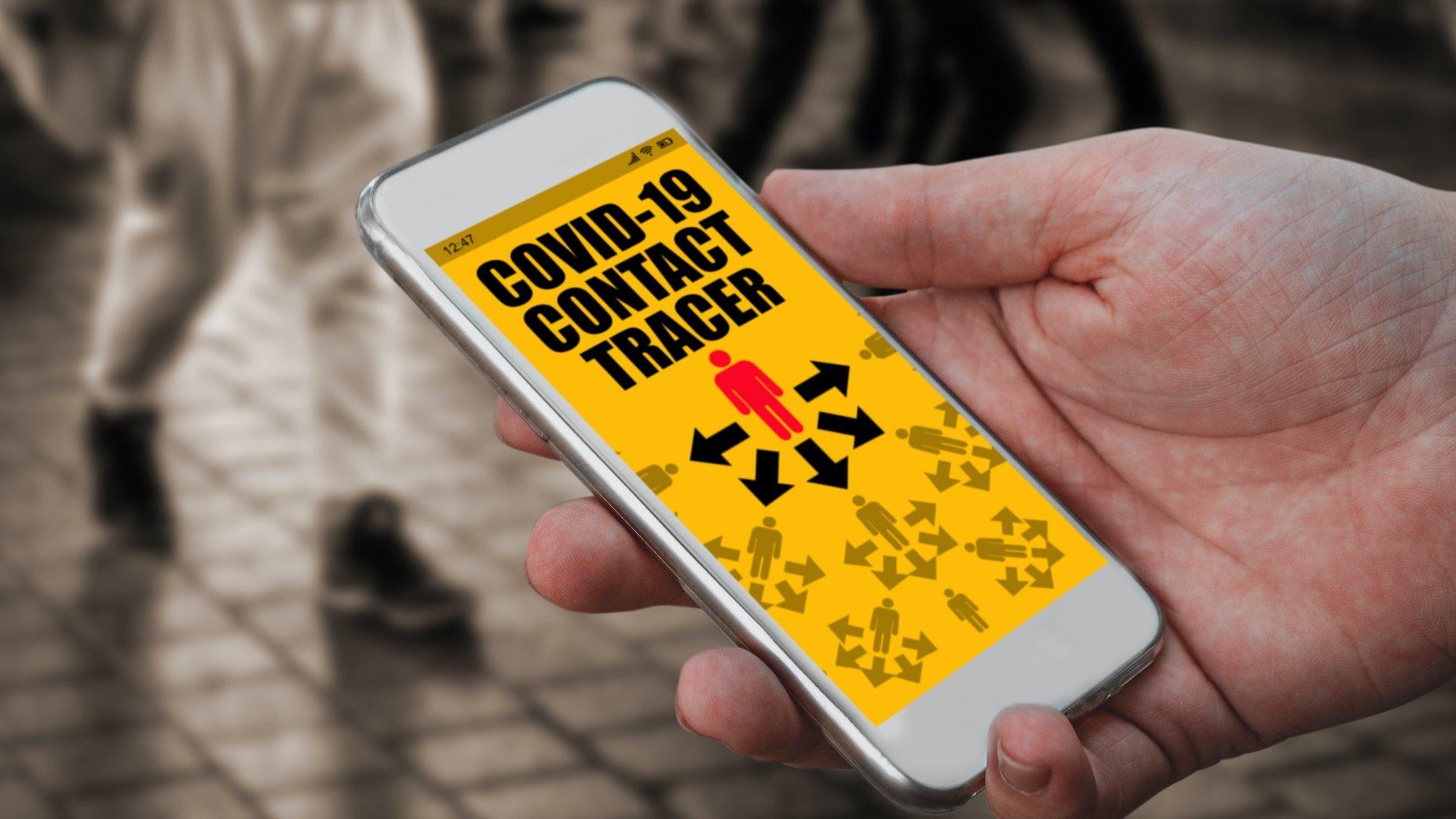Coronavirus: Contact tracing 'could be in place for two years'
- Published

The First Minister Arlene Foster has said that NI could have contact tracing for "quite some time, possibly even up to two years".
She was speaking on the BBC's Andrew Marr Programme on Sunday.
Northern Ireland was the first of the four UK administrations to roll out a contact tracing programme, as part of its plans to tackle coronavirus.
She said contact tracing was vital to "make sure that we know where the virus is in our community".
On Sunday one more coronavirus-related death was recorded by the Department of Health, bringing its total, of mainly hospital deaths, to 523.
There are now 4,716 confirmed cases in Northern Ireland, an increase of seven from Saturday.
The Republic of Ireland recorded two further deaths related to Covid-19 on Sunday. There have now been 1,652 coronavirus-related deaths in the country.
"It's something that is forming the cornerstone of coming out of lockdown and being able to relax those regulations which we understand are very draconian," she added.
A manual system is currently being used and she told the programme it has been going well.
She said that about 30 cases a day are contacted and subsequently, those they have had contact with, are spoken to.

Staff at Belfast's contact tracing centre, run by the Public Health Agency
"Contact tracing is very much about coming out of restrictions. It's testing, tracing, isolating and then supporting those who we need to contact," she said.
"We are scaling that up and will be able to scale it up and down," she added.

Analysis:
By Mark Devenport, BBC News NI Political Editor
Earlier, the Infrastructure Minister Nichola Mallon told Sunday Politics that communication from the executive about lockdown easing could have been better.
The question is - is that a criticism of their communication generally or that they are heading into difficulties in the substance of the message?
It is perhaps more substantial than just communication.
We have had direct, contradictory statements about things like dog groomers while hotels are being told they can take bookings when they already have been taking them.
Looking back at the Pathway to Recovery we have to ask whether the whole notion of people being able to meet indoors should ever have been in that step one as it's clear, now that they have looked at it in more detail, that it should happen later down the road.

More than half of coronavirus related deaths in NI have happened in care homes and Mrs Foster said care home residents were "at the top" of the testing strategy but she said the executive was "conscious of the difficulties in care homes".
'Without a rulebook'
She rejected any suggestion NI care homes had not been dealt with well at the beginning of the crisis.
"If you speak to care home leaders they will recognise the Department of Health did work with them," she said,
She said coronavirus was something "no one knew how to handle at the time".
"It was novel and we had to deal with it without a rulebook," she said.

Both the Republic of Ireland and UK governments have been working on separate apps - but in NI the tracing is done via a phone call
"There will be plenty of time to look back but at the moment we need to fight the battle in care homes," she added.
On the issue of abortion, Mr Foster said she was "not embarrassed" that women in Britain who wanted an early termination had been able to use telemedicine and get pills sent to them but not women in Northern Ireland.
"Here in NI we value life and want to support women who find themselves in crisis pregnancy," she said.
"Unfortunately there are a lot of people who have not been able to access health care in NI for non-covid situations," she added.
She said the health system must now be "switched on again".
Mrs Foster also told the programme people in Northern Ireland have "been very good" in sticking to the Covid regulations.
But Stormont's infrastructure minister said there is a responsibility on all ministers to communicate "clearly and consistently" with the public when discussing lockdown relaxation.
Nichola Mallon said people are craving a timeframe for when businesses can reopen.
"If compliance drops, we could be in a situation where we move backwards and reintroduce restrictions," she told the BBC's Sunday Politics programme.
Meanwhile, on Sunday evening, the Department of Health said it intends to issue updated guidance for those shielding this week, amid the easing of lockdown restrictions.
"We are aware of the recent announcement made for England," a Department of Health statement read.
"Naturally people shielding here will want to know about our plans. We are committed to bringing the shielding programme to a close as quickly as the scientific and medical evidence allows. However, this must be driven by an assessment of the risks locally. We cannot simply react to what is happening in other jurisdictions.
"We aim to be in a position this week to issue updated shielding guidance covering specific issues on going outside while maintaining social distancing."

A SIMPLE GUIDE: How do I protect myself?
AVOIDING CONTACT: The rules on self-isolation and exercise
WHAT WE DON'T KNOW How to understand the death toll
TESTING: Can I get tested for coronavirus?
LOOK-UP TOOL: Check cases in your area

- Published12 May 2020

- Published20 April 2020
